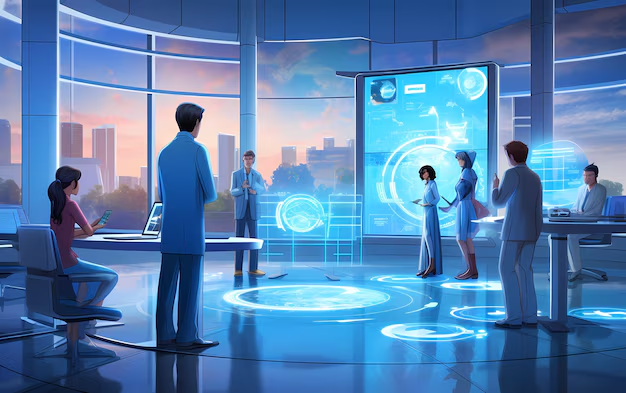In the 21st century, technology innovation is driving a profound transformation in business, society, and every aspect of human life. As the world becomes more interconnected and reliant on digital tools, the role of technology in shaping the future has never been more significant. From artificial intelligence (AI) and blockchain to renewable energy technologies and the rise of 5G connectivity, technological advancements are altering industries, economies, and even cultures.
In this article, we will explore the powerful influence of technology innovation, focusing on its ability to reshape business models, streamline processes, and enhance the way we live. We will examine the major trends in technological innovation, their impact on society, and the challenges that come with adopting cutting-edge technologies. Along the way, we will also highlight key examples of how businesses and communities can harness these innovations to drive growth, sustainability, and progress.
Key Takeaways
- Technology innovation is driving profound changes in business and society, enabling new business models, improving efficiency, and transforming industries.
- Emerging technologies such as AI, blockchain, and IoT are creating opportunities for growth, while also presenting challenges like ethical concerns and job displacement.
- Bridging the digital divide and ensuring responsible innovation are crucial to ensuring that the benefits of technology are accessible to everyone.
The Role of Technology Innovation in Business

Technological innovation has historically played a crucial role in enhancing business operations, improving productivity, and opening new markets. Today, the pace of technological advancement is faster than ever, and businesses are expected to stay ahead of the curve to remain competitive.
Transforming Business Models
Innovation in technology enables businesses to develop new models, products, and services that were once unimaginable. This transformation is visible across industries, where companies are rethinking their traditional structures to take advantage of new technologies.
- E-Commerce Revolution: The growth of e-commerce platforms, powered by technologies such as cloud computing, data analytics, and mobile apps, has disrupted the retail sector. Companies can now reach global markets, provide personalized experiences, and optimize supply chains in real-time.
- Subscription-Based Services: The shift from ownership to access, powered by cloud-based software and streaming technologies, has given rise to subscription-based models in industries like entertainment, software, and even transportation (e.g., car-sharing services like Uber).
- AI and Automation: The implementation of artificial intelligence and automation in business operations is transforming everything from customer service (via chatbots and virtual assistants) to inventory management, logistics, and HR processes.
Enhancing Productivity and Efficiency
Technology innovation has allowed businesses to optimize internal processes and significantly reduce costs. Automation tools and software enable companies to streamline repetitive tasks, while AI-driven analytics provide valuable insights into performance and customer behavior.
- Data Analytics: Companies today have access to vast amounts of data, and technological tools can help turn this data into actionable insights. By utilizing AI, machine learning, and big data analytics, businesses can better understand customer preferences, predict trends, and tailor their offerings accordingly.
- Cloud Computing: The widespread adoption of cloud services has transformed the way companies store data, collaborate, and scale operations. Cloud computing allows businesses to quickly adapt to changing demands, reducing the need for costly infrastructure and making remote work and global collaboration possible.
- Supply Chain Optimization: Real-time tracking, predictive analytics, and automated warehousing powered by IoT (Internet of Things) devices are making supply chains more efficient, reducing lead times, and lowering operational costs.
Technology Innovation and Society
Beyond business, technology innovation is transforming the fabric of society. As new technologies emerge, they shape how we communicate, learn, work, and interact with each other. The impact of innovation in technology goes beyond just business profits—it’s influencing cultural norms, social behaviors, and the way governments operate.
Changing the Way We Work
One of the most significant societal changes brought about by technology innovation is the way we work. Remote work, flexible hours, and the gig economy have all been made possible by advancements in digital tools, cloud computing, and communication platforms.
- Remote Work: The COVID-19 pandemic accelerated the adoption of remote work, and technology has played a key role in this transition. Tools like video conferencing, collaborative project management software, and cloud-based file sharing have enabled companies to continue operations seamlessly, despite physical distancing measures.
- The Gig Economy: Platforms like Uber, Lyft, and Airbnb have revolutionized the way people earn a living, allowing individuals to monetize their skills or assets (such as their car or home) without being tied to a traditional 9-to-5 job. The gig economy, fueled by technology, offers flexibility but also presents challenges related to labor rights and job security.
Health and Wellness
The healthcare sector has seen profound transformations as a result of technology innovation, especially in recent years. The rise of telemedicine, wearable health devices, and AI-assisted diagnostics is making healthcare more accessible, personalized, and efficient.
- Telemedicine: The ability to consult with a healthcare professional via video calls or other digital means is expanding access to healthcare services, especially in underserved areas. Remote monitoring tools and virtual consultations help patients receive care without the need to visit a clinic.
- Wearable Devices: Fitness trackers, smartwatches, and other wearable devices collect health data such as heart rate, sleep patterns, and activity levels. These devices allow individuals to monitor their own health, and in some cases, even share this information with doctors for more accurate diagnoses and treatment plans.
- AI in Diagnostics: Artificial intelligence is revolutionizing diagnostics by analyzing medical data faster and more accurately than humans. AI algorithms can now assist doctors in detecting conditions like cancer, heart disease, and neurological disorders at an early stage, improving patient outcomes.
Education and Learning
Technological innovation is also transforming the way we learn and acquire knowledge. The rise of e-learning platforms, educational apps, and virtual classrooms is providing greater access to education and making learning more personalized and interactive.
- E-Learning Platforms: Platforms like Coursera, Udemy, and Khan Academy allow students of all ages to access courses on virtually any subject. These platforms are democratizing education, making it available to anyone with an internet connection.
- AI in Education: Artificial intelligence is being used to create personalized learning experiences. By analyzing data on student performance, AI systems can adapt content to meet individual learning needs, allowing for a more tailored approach to education.
- Virtual and Augmented Reality: VR and AR technologies are creating immersive learning experiences. For example, medical students can practice surgeries in a virtual environment, while history students can take virtual field trips to ancient civilizations.
The Challenges of Technology Innovation

While the benefits of technology innovation are clear, there are also significant challenges that come with it. Businesses and societies must navigate these obstacles to ensure that technology serves everyone fairly and responsibly.
Ethical and Privacy Concerns
With the rise of digital tools and AI comes the increasing collection of personal data. This raises concerns around privacy, data protection, and the potential misuse of information.
- Data Privacy: As more personal data is collected, there is a growing need for stronger data protection laws and regulations. Consumers must have control over how their data is used and stored.
- AI Ethics: The development of AI systems that make decisions in areas like hiring, healthcare, and law enforcement presents ethical concerns. For example, algorithms that are biased or discriminatory could perpetuate existing inequalities.
Job Displacement and Skills Gaps
Automation, AI, and robotics are replacing certain jobs, especially those that involve routine or repetitive tasks. While technology is creating new opportunities, there is a need to reskill workers who may be displaced by these advancements.
- Reskilling and Upskilling: Governments and businesses need to invest in programs that help workers transition into new roles, providing opportunities for retraining and skill development.
- Job Creation vs. Job Loss: While technology has the potential to create new industries and job categories, there will be sectors that experience job displacement. A balance must be struck between innovation and ensuring that workers are not left behind.
Accessibility and Inequality
Not everyone has access to the latest technologies, and this digital divide can exacerbate existing inequalities. Whether it’s access to the internet, digital literacy, or the affordability of devices, bridging the gap is essential for ensuring that technological advancements benefit everyone.
- Global Disparities: While advanced nations may embrace cutting-edge technologies, developing countries may struggle to keep up, limiting their access to the benefits of innovation.
- Socioeconomic Divide: The wealthiest individuals and companies often have the resources to leverage the latest technologies, while others are left behind, contributing to increased societal inequality.
Also Read : The Future Of Innovation: Navigating Technology Advancement In The 21st Century
Conclusion
The power of technology innovation is shaping the future in profound ways. From revolutionizing business models to transforming society, technological advancements are unlocking new opportunities and possibilities. However, as we embrace these innovations, it’s essential to address the challenges they bring, including ethical considerations, job displacement, and inequality. By doing so, we can ensure that technology serves as a force for good, driving progress and improving lives across the globe.
FAQs
How is technology innovation impacting business models?
Technology innovation enables businesses to create new products, services, and ways of operating. E-commerce, subscription-based services, and AI-driven automation are examples of how businesses are changing their models to stay competitive.
What are some examples of technological innovations in healthcare?
Telemedicine, wearable health devices, AI diagnostics, and robotic surgeries are just a few examples of how technology is transforming healthcare, improving access and patient outcomes.
How does AI contribute to business efficiency?
AI can automate repetitive tasks, analyze large datasets, predict trends, and enhance customer service through virtual assistants and chatbots, leading to greater business efficiency and productivity.
How is technology innovation changing education?
Technology is revolutionizing education through e-learning platforms, AI-powered personalized learning, and virtual reality simulations that offer more interactive and accessible learning experiences.
What ethical concerns come with technological innovation?
Key ethical concerns include data privacy, AI bias, job displacement, and the potential misuse of technology. Addressing these concerns requires responsible innovation and regulation.
Will technology create or eliminate more jobs?
While technology can eliminate certain jobs, it also creates new roles and industries. Reskilling and upskilling are critical for ensuring workers can transition into new opportunities created by technology.
How can society ensure equal access to technological innovations?
Bridging the digital divide, improving digital literacy, and ensuring affordable access to technology are essential steps in ensuring that technological advancements benefit all members of society.

